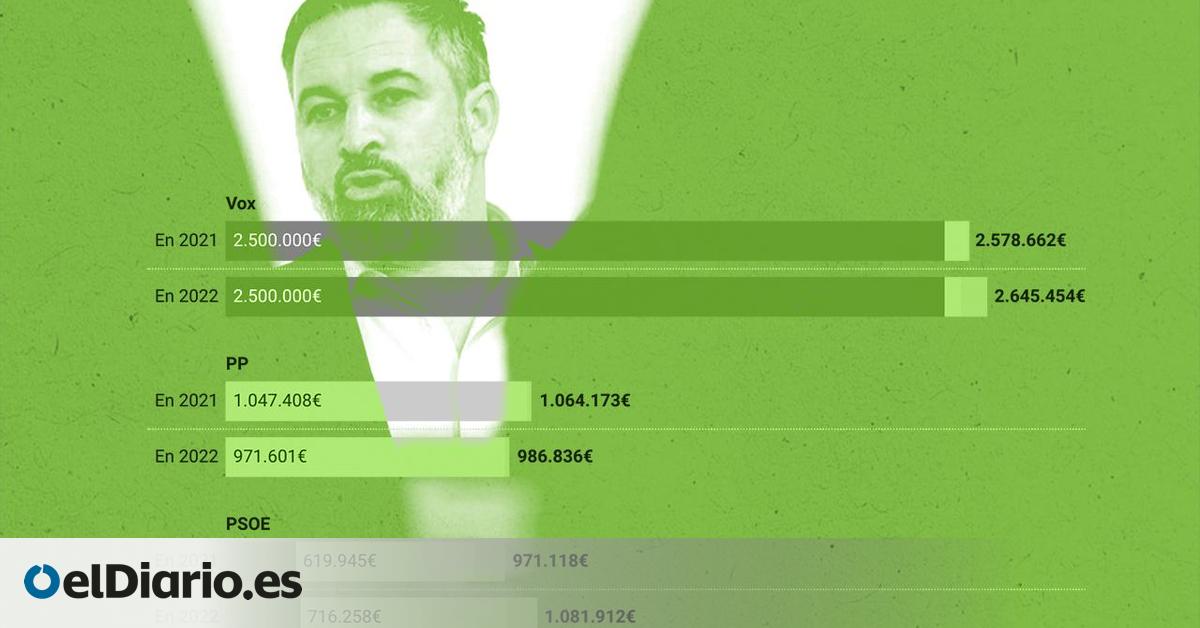
It is not common for a political party to go bankrupt so that its foundation – generally dedicated to social issues and with a more philosophical component – has a lot of money. Even less if this happens at the same time that the party has to request loans from foreign banks to be able to face electoral processes, as happened to Vox in the 2023 general elections.
Abascal’s party transfers 2.5 million euros every year to Disenso, the think tank nominally chaired by Santiago Abascal and from which conferences, publications are organized or financed. The Gazette. This money comes from membership fees or is public money that the party receives according to its electoral results and the number of deputies it obtains. With it, Vox transfers funds to Disenso to organize events, almost always related to the ultra international, or documentaries in support of Bolsonaro, events with Milei or talks and reports against what the party calls “woke.”
The Court of Auditors – the largest administrative oversight body in Spain and with sanctioning power – has published a recent report in which it emerges how foundations linked to political parties in Spain are financed and with how much money, understanding the link in the sense that the party appoints positions, has some executive capacity, contributes the majority of the money or was founded with money from the party. In the report, it is clear that Disenso’s case is unique. In the years analyzed (2021 and 2022), it received 2.5 million from Vox, while its income through other means was infinitely less: 91,920 euros donated by two people and two companies (the analysis does not reveal names).
Another common source of income for foundations is public subsidies. In this case, Disenso received a total of 132,000 euros from the Ministry of Culture in 2021 and 2022, aid to which every foundation linked to a political party is entitled and which is proportional to its representativeness in Congress and the Senate. In addition to this, there may be other public financing organizations. For example, it is common for the Ministry of Foreign Affairs, which has an annual plan framed for this type of organization and which grants in the field of cooperation.
Contrary to what happens in Vox, the rest of the parties are very far from the figures for transferring funds to their political foundations. For example, the PP is linked to two foundations: Popular Basque Studies and Concordia y Libertad. The party does not give them money. However, the second receives more public subsidies than usual: the Madrid City Council, the Community, the Xunta de Galicia, the Junta de Castilla y León (all in the hands of the PP) and from organizations such as the HIV Council of the Dominican Republic or the Global Fund to Fight AIDS. In this concept of public aid, it added two million in the two years analyzed. Disenso also obtained foreign aid starting in 2022, although it does not appear in the report.
PSOE and Podemos
The PSOE has ten linked foundations, but only four with relevant financial activity in the years analyzed. In 2021, the Socialist Party transferred 242,000 euros to its think tanks, and 259,000 the following year, with the Pablo Iglesias Foundation being the main beneficiary. In public subsidies it totaled 1.3 million, below the two million of the PP. In addition to the usual organizations (Foreign Affairs and Culture), the foundations linked to the PSOE obtained 10,000 euros from the Community of Madrid. Also 500,000 from the Basque government and provincial councils in the case of the Ramón Rubial Foundation.
The case of Podemos is far behind in the financing of foundations. The party did not transfer money to its related organizations in 2021. In 2022, the Republic and Democracy Institute did receive money from the party: 3,376 euros. In addition, this institute and the 25 de Mayo Institute received 60,000 euros in those two years from private donations and 170,000 in public subsidies from Culture and Outdoors.
The Report has analyzed 36 foundations in 2021 and 34 in 2022 and points out some non-compliance “both in the case of private donations and public subsidies”, so it announces that it will inform the organizations that granted the subsidies so that they can request the corresponding reimbursement. It refers to 6,000 euros of advice presented as eligible for subsidies by the Rubial foundation and paid for by the Basque government.
The Plenary Court also recommends in its analysis that “foundations and other entities linked to or dependent on political parties must undergo an external audit and submit it to the Court of Auditors.” And it makes another general recommendation, once the activity of these organizations linked to parties has been analyzed: “They should adapt their actions to the realization of their own founding purposes, preventing their activity from being limited, in practice, to the mere possession of real estate or, in general, to obtaining resources, which are made available to the political parties to which they are linked or on which they are dependent.”
The millionaire transfers from Vox to Disenso that are portrayed in this report were also controversial among its bases and some critical officials, who understood that the money should remain in the political party to face organic and electoral expenses. The unrest generated by the fact that more than 10 million have been transferred in recent years forced the general secretary, Ignacio Garriga, to send a massive letter to the militancy justifying the transfers. The Court that prepared the report is the same one that fined Vox in July for the third time after detecting irregularities in the party’s accounts, bringing the sanction to Abascal’s party to more than one million euros for violations of the financing law.
Source: www.eldiario.es

